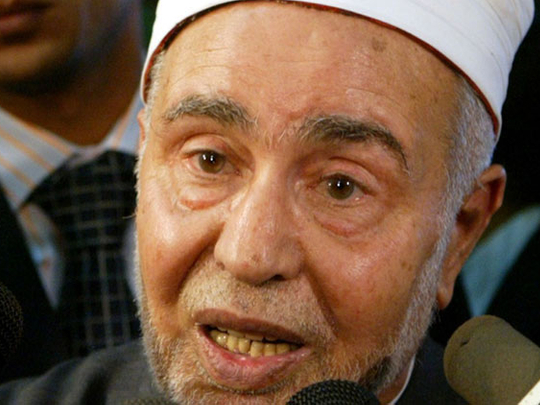
Riyadh: Mohammad Sayed Tantawi, the Grand Imam of Cairo’s Al Azhar Mosque and the Grand Shaikh of Al Azhar University, died Wednesday of a heart attack, while on a visit to Saudi Arabia.
Witnesses told Gulf News that Tantawi collapsed at the Riyadh International Airport as he was about to board his flight back to Cairo on Wednesday.
He was rushed to the Emir Sultan hospital in Riyadh where doctors proclaimed him dead.
The official Mena news agency reported that Tantawi, 81, was in Riyadh to attend the King Faisal awards ceremony.
Tantawi will be buried in Madinah, according to his family.
Abdullah Al Naggar, advisor to the shaikh, told Egypt's Nile News television the death was a surprise, saying that before leaving to Saudi Arabia the shaikh had seemed in "excellent shape and health."
A member of Tantawi's office, Ashraf Hassan, told a news agency that Mohammad Wasel, Tantawi's deputy, was expected to temporarily take over leading the institution until the Egyptian president appointed a new head for the body.
Born on October 28, 1928, Tantawi was appointed the Grand Mufti of Egypt in 1986.
He held the position for almost 10 years, until he was appointed Grand Imam of Al Azhar Mosque and Grand Shaikh of Al Azhar University, the highest seat of Sunni learning, by Egyptian President Hosni Mubarak in 1996.
Al Azhar has schools, universities and other educational institutions across Egypt.
Tantawi’s views on a wide range of subjects, such as the Islamic veil in France, abortion, suicide bombings and women imams, often created controversies.
Late last year, Tantawi caused a big stir in Egypt, a predominantly Muslim country, when he banned the niqab (a full-face veil) at woman-only institutions of Al Azhar, which is one of the Sunni world’s most influential seats of learning.
At the time, Tantawi said that the niqab “is a traditional costume, which has nothing to do with Islam”.
A few weeks later, a similar ban was imposed by authorities at Egypt’s public universities, much to the protest of Islamists and human rights activists.
Two years ago, Tantawi, often criticised as a pro-government cleric, came under fire in Egypt when he was shown in pictures shaking hands with Israeli President Shimon Peres at a conference on inter-faith dialogue in Geneva.
An embattled Tantawi said he had not recognised Peres.
Egypt was the first Arab country to sign a peace treaty with Israel in 1979. But anti-Israel feelings run high in the Arab world’s most populous country.
In 1997, he lent his blessings to a controversial campaign launched by the Egyptian authorities against female genital mutilation. He said the centuries-old practice was un-Islamic.
“The Ulema (theologians) of Islam are unanimous in agreeing that female circumcision has nothing to do with Islam,” he was quoted as saying.
In 2001, he drew massive criticisms for condemning suicide bombings as being against Islam. His fatwa was declared as the Palestinians were engaged in their intifada against Israeli occupiers, much to support from many Egyptians.
In December 2003, Tantawi angered many Muslims when he said that the French government had the right to ban the hijab (a headscarf worn by Muslim women) in schools.
Tantawi was no stranger to controversy as Grand Mufti of Egypt either. He issued a contentious fatwa (a religious edict) ruling that the interest rates offered by banks to depositors comply with the Islamic Sharia (law)
Tantawi led the prayers at the funeral of Palestinian icon Yasser Arafat in 2004.












